Inappropriate because it does not have the applications necessary for work and entertainment. We will not convince them, but will share with those who have already installed this system what the best programs for Ubuntu are.
Review of the best and necessary programs for Ubuntu - read our article
Working tools are not a package office applications, as one might assume, but a small drawer in the closet with a hammer, screwdrivers, and wrenches, which is useful for everyone to have in the house. Let's start with it, because for many it is important to customize the computer for themselves, and only then proceed to further actions. The best programs of this kind will help you do this.
Double Commander
A file manager is needed in any system. Ubuntu also has it, but many users may not have enough of it. Double Commander- this is a full-fledged file manager, a clone of the popular TC for Windows.
- Two working windows.
- Protocols supported: FTP, WebDav, Samba, SSHFS and others.
- Tabbed support.
- Versions for 32-bit and 64-bit systems.
Can be downloaded additional plugins to expand the already immodest functionality.
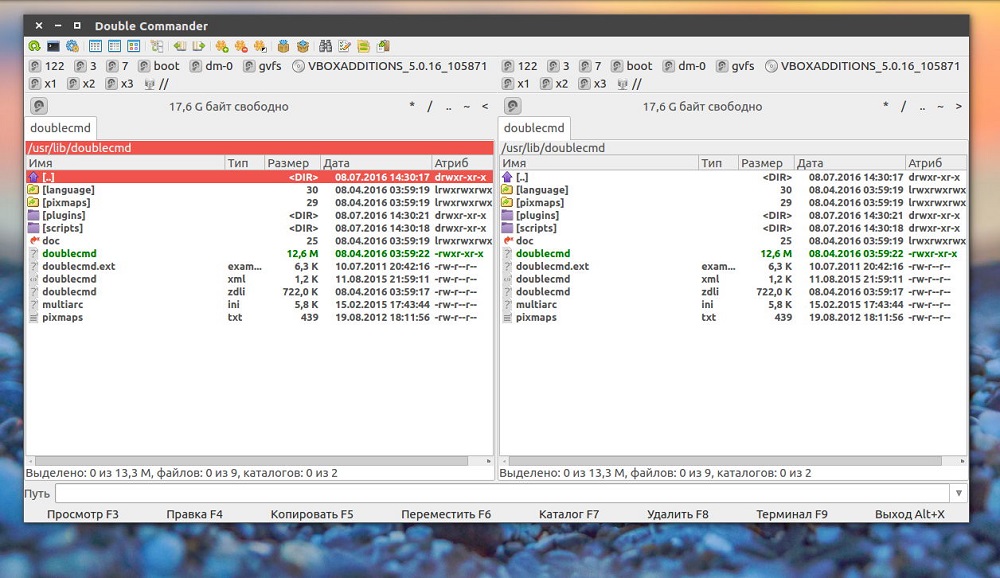
Standard Ubuntu interface may not be to everyone's taste. Fortunately, there is a program that allows you to transform the appearance of the system almost completely. With Unity Tweak Tool you can easily personalize your PC.
- Configuring the window switch.
- Setting up window animation.
- Cursor and font settings.
- Settings background images desktop, boot display.
The range of program functions is not limited to this.
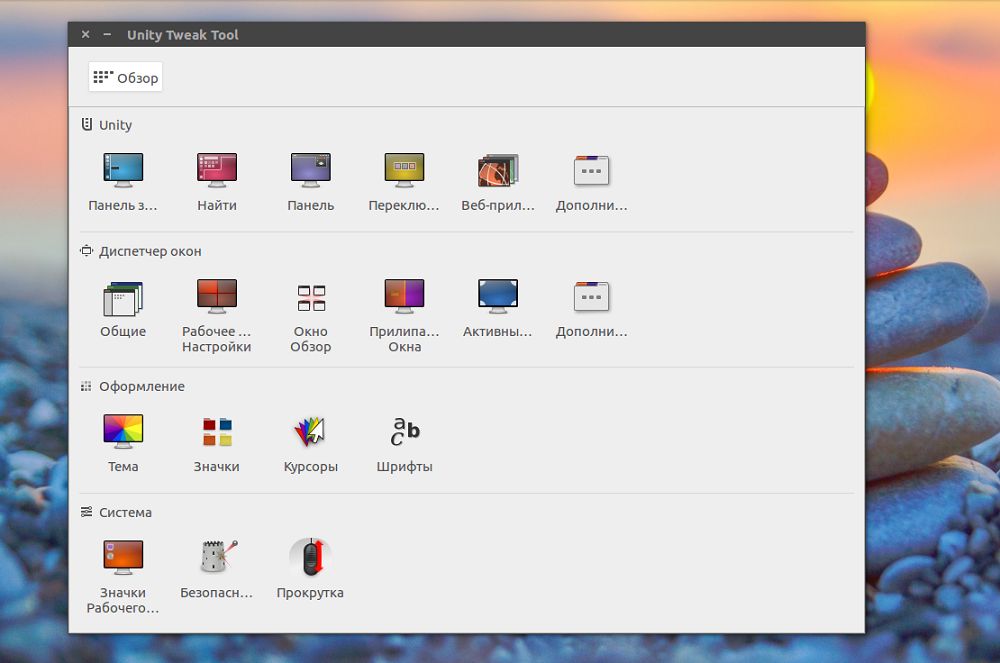
GParted
Custom visualization settings, as well as moving files - wallpapering and furniture arranging. And GParted is responsible for the wiring, plumbing and gas, if you like. The program allows you to regulate and control the space on your hard drive, as well as re-partition.
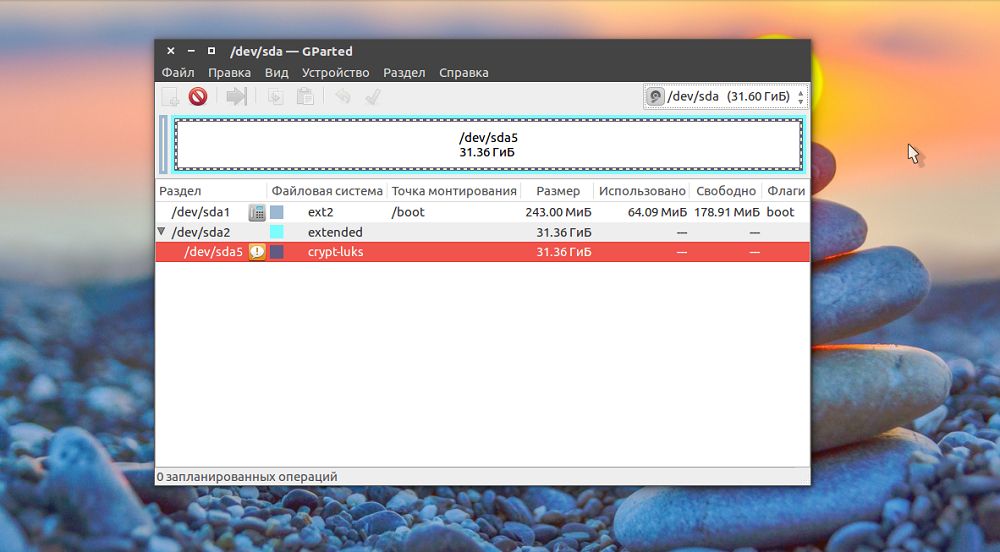
But these are probably its simplest functions. In general, the application is responsible for many system settings. You won't need to use it often, but it's worth having just in case.
Intel Graphics Driver Installer
The program is suitable only for those who have a processor with an Intel video card. Intel Graphics Driver Installer makes downloading and installing any graphics driver much easier. Now the user will have to do practically nothing, since the program independently finds the necessary components.
Desk
LibreOffice
Previously, this set of applications was a competitor Microsoft Office it was difficult to name. But today it is a fairly powerful multifunctional package that is very convenient to use.
- Text editor Writer;
- Calc table editor;
- Impress presentation editor;
- Vector graphic editor
The main thing is that all this is available completely free, like the bulk of software on Ubuntu.
Kingsoft Office
Chinese developers have worked hard to create a product that is as similar as possible to Microsoft Office. From this came Kingsoft Office. It is not inferior in quality to its original and is distributed free of charge. Unless it's him latest versions look like old Microsoft versions Office.
Creative workshop
A section for which many Windows fans dislike Ubuntu. Yes, Photoshop and other Adobe applications are not officially ported to Linux. But there are two options: use Wine's help or install a good substitute.
Gimp
Of course, Gimp. Even on Windows there are fans of this program. Of course, it is not so powerful, the functionality is less than in Photoshop. However, she will perform most basic actions without difficulty. For a simple user If you occasionally need to edit your photos, the program will be enough for you.
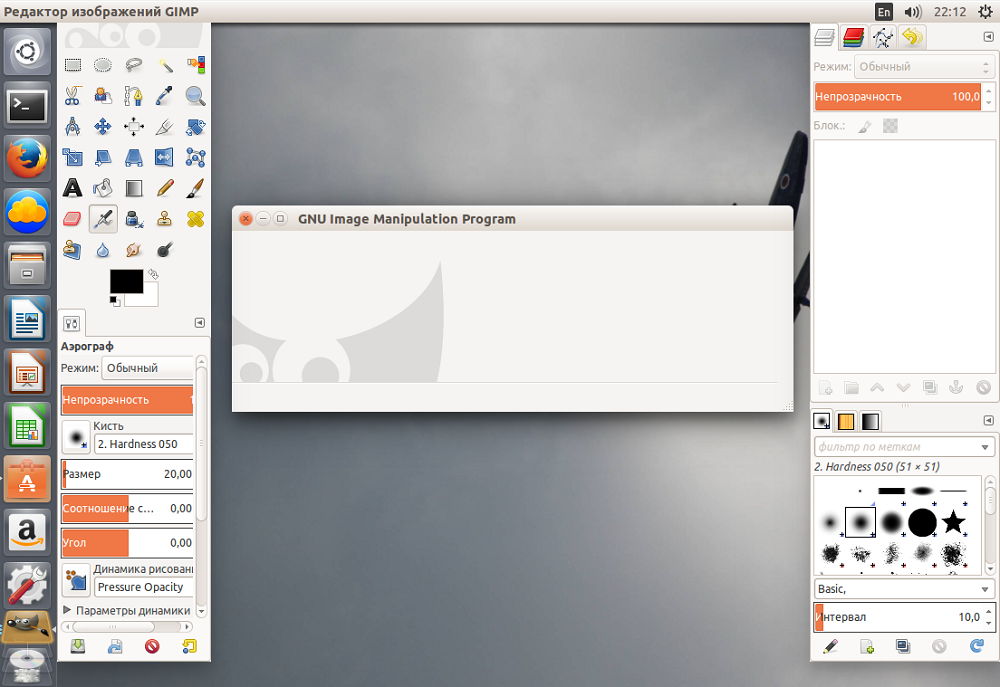
For Photoshop connoisseurs who are determined to switch to Ubuntu, there is also a way out. You can download a special settings package that will make the entire interface indistinguishable from an Adobe product.
OpenShot
OpenShot is a freely distributed video editor. It has a wide range of capabilities, which only increase year after year, as the program is constantly being worked on.

Quite convenient to use. Therefore, do any simple steps With video it won't be difficult. Supports a huge number of different video formats.
Lightworks for Linux
Lightworks is already a full-fledged professional video editor. If you need a little more than cutting a family video and making beautiful transitions, then it's worth using.
Lightworks has been produced since 1989, so the software developers have their own experience and history. The program was recently ported to Linux. The ideas and solutions of the editor's creators are quite unique; not all of them can be found in other programs.
Network connections
Here, the user is unlikely to have problems with adaptation after Windows. Most browsers: Mozilla Firefox, Google Chrome, Opera - also exist on Ubuntu. Moreover, Firefox is the built-in browser by default. The only thing missing from this popular company is Yandex and Internet Explorer. But no one will probably miss the latter.
Chrome can be highlighted separately. Here, in addition to the traditional version, there is a version of Chromium with open source code. This web browser supports many applications, some of which will certainly interest the user. In addition, user data tracking modules are disabled here.
This is one of the applications for Chromium. Pocket is probably familiar to many smartphone owners. Using it, you can save any text materials from the Internet, and then read them at a convenient time.
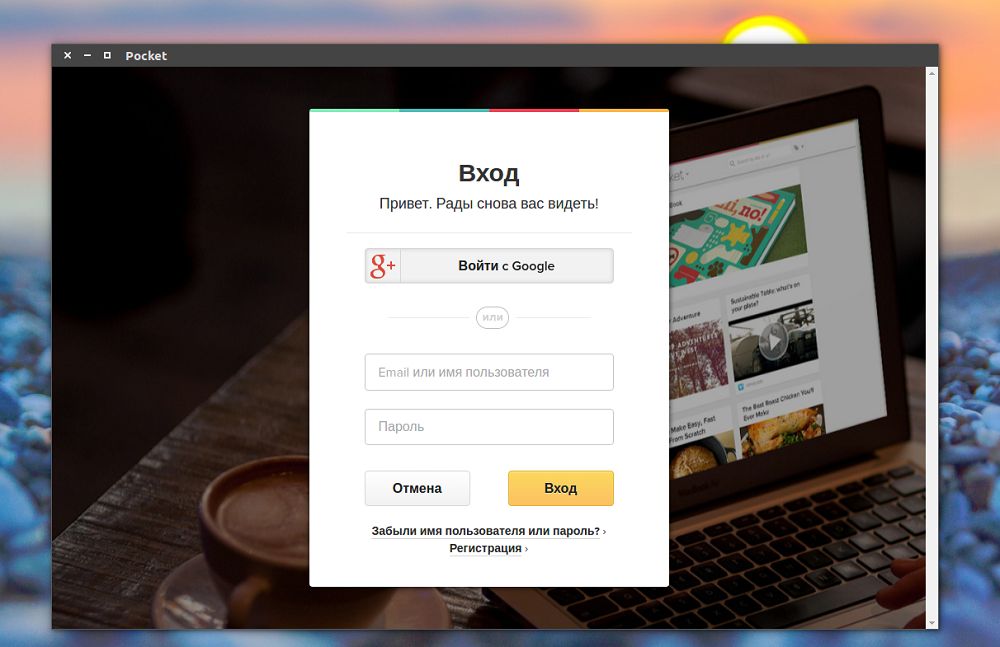
The most interesting thing is that you can read even offline. And if you log into your account, you can synchronize it with your smartphone and other devices.
Wunderlist
This is another Chromium app. Wunderlist is one of the most popular organizers on iOS. With this little program you can make any kind of list: from a shopping list to a plan for the year. You can share these lists with other users, and also add them to your other devices.
Mailboxes and telephone
Here are all the convenient clients that allow you to manage mail, chat on social networks, and call friends via video and audio.
Skype
The world's most popular dialer is also available on Ubuntu. Everything here is no different from analogues from other systems. The version for Linux platforms has existed for quite a long time. But the program is constantly being refined and improved.
Thunderbird
It's beautiful and slightly specific mail client. Available by Mozilla. Thunderbird is quite user-friendly, but some users will need to get used to it first. Especially for those who switched from Gmail. In general, it works well with any mailbox.
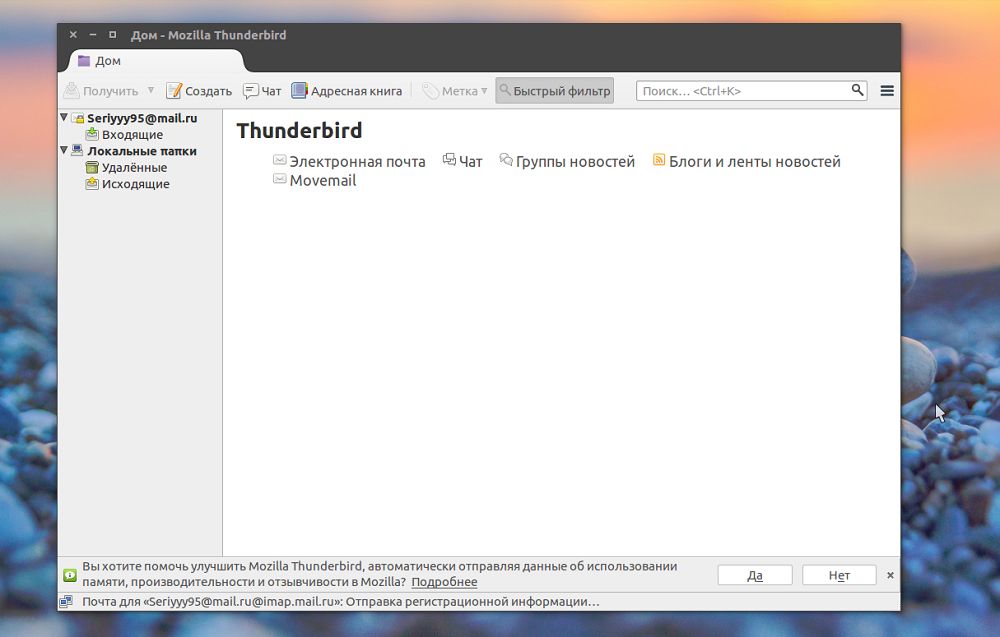
Birdie Twitter App
For a long time, the popular blue bird did not mesh very well with the Linux penguin. And now, finally, a smart client has come out for one of the most popular social networks. With the help of Birdie Twitter App it is quite convenient to “tweet”, “retweet” and simply read other users.
Pidgin
Pidgin is a special program for fast messaging. The application is very easy to use, supports most popular instant messengers: ICQ, Jabber, Google Talk, IRC, Mail.ru Agent. It makes it easy to share emoticons, files, edit your profile and do much more.
Home cinema
It is enough to place one application here. Almost all the best programs on any platform are unlikely to outshine VLC. This little popular video player is an omnivore not only in terms of formats, but also in terms of operating systems. Of course, there is a version on Ubuntu. And as always, it's free. With VLC you can easily play any video without any problems, as well as adjust the screen size, subtitles and other settings.
Music Center
Rhythmbox
This is a standard player. And you are unlikely to want to give it up. Rhythmbox is as much a part of Ubuntu as iTunes is a part of iOS. The application fits seamlessly into the system and effectively performs all assigned tasks. Listening to music through Rhythmbox is very convenient.
In addition, there is not only music, but also podcasts. The program also easily plays streaming radio broadcasts and Internet radio. The advantage here is that there is a convenient catalog where it is easy to distribute all the songs, artists, and albums.
EasyTag
If there are iTunes fans among Ubuntu users, then they will certainly appreciate this program. EasyTag makes filling out audio tags fun. Any music lover will appreciate the capabilities of this application.
- All popular audio formats.
- Receiving data from the network.
- Filling tags using information from the file name and vice versa.
Game center
This is another bump that people who are planning to install Ubuntu stumble over. Many players are very confused by the lack of many games, especially popular new ones. Yes, you can’t play the new games, and if you do, it’s very difficult. However, it's not all bad. There are already thousands of games on Ubuntu. And there are two convenient services that allow you to obtain these games.
SteamOS + Linux
Download a simple application from Steam, and then enjoy the most popular games. Both offline and online. Now available for Linux via Steam:
- Counter Strike;
- Counter Strike: Global Offensive;
- Half Life 2;
- Left2Dead2;
- Dota 2.
This, of course, is not all. However, for avid fans of online games, the most popular games will be enough.
PlayOnLinux
PlayOnLinux is based on another popular program - Wine, but is tailored specifically for games. Naturally, not all games that are on the PC appear in this program. However, a large number of enthusiasts are working to ensure that Linux users can enjoy a wide variety of computer games. Most likely, you can find most of the classic games for PlayOnLinux. Perhaps something newer too.
On Ubuntu and on Linux in general, even in 2017, there is not much popular programs. However, in this system you will neither have to die of boredom nor sit around without the opportunity to work. It has all the necessary tools for work, entertainment and communication. Every year there are more and more such instruments, and their quality increases. As you can see, Ubuntu with the right software can become the same “home” for you as Windows, even better.
This year has been quite fruitful for the world of free operating systems. Ubuntu continues its offensive on desktops, in which Microsoft unexpectedly helped it with its vague Windows 8, and Canonical is already trying to establish its presence on smartphones and tablets.
This was largely possible due to the fact that software for systems on Linux based continues to develop at a rapid pace, and users are convinced that they can solve almost any of their problems with its help. Today we would like to introduce you to a slightly shortened list of the best Linux programs, according to the authoritative publication OMG! Ubuntu!
Geary
Geary is a lightweight email client designed to work in the Gnome environment. It is designed for convenient and fast work with e-mail, and the emphasis is on simplicity and speed. The program is built on a modular principle, which will allow developers to add necessary functions in the future in the form of separate plugins.
Birdie Twitter App
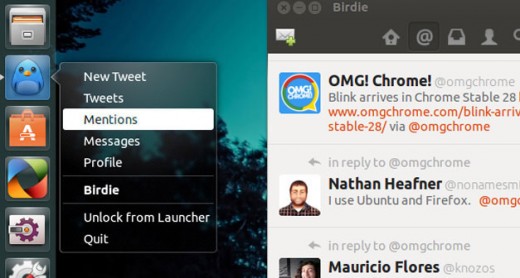
Until recently, we did not have a more or less decent client for Twitter, at least comparable to existing programs for other platforms. Everything changed with the appearance in March of this year. Today he has turned from a chick falling at every step into a completely mature and beautiful bird.
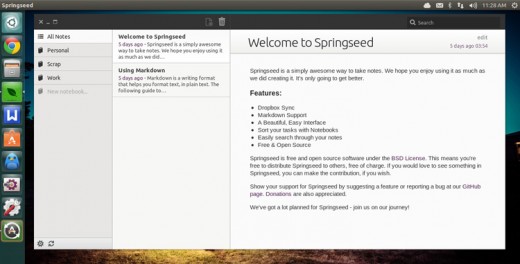
Springseed is a simple and easy to use notepad. Features include Dropbox integration, support for text formatting, notepad creation, and a beautiful, clean interface.
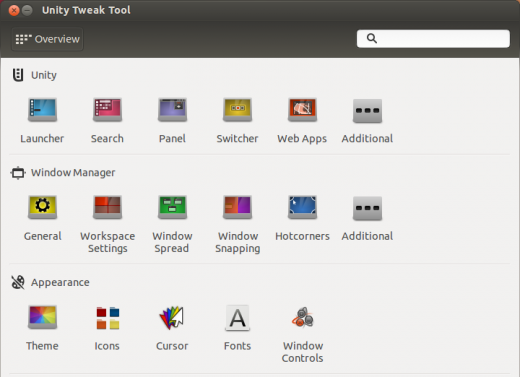
Don't like Unity? You just don't know how to cook it!
A special utility for setting up this working environment contains so many different options that you can definitely customize Unity for yourself. Themes, button layout, scroll bars, fonts, hot zones, taskbar and other elements of the operating system are now under your control.
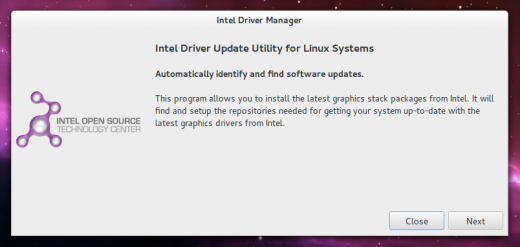
Until recently, installing drivers on Linux was not a task for the faint of heart. But gradually manufacturers are simplifying this process more and more, and the example in this is set by Intel company, the drivers of which can be installed literally in one, two, three times. The utility they released automatically detects the equipment, loads necessary drivers and installs them into the system, after which it also monitors their timely updating.
VLC
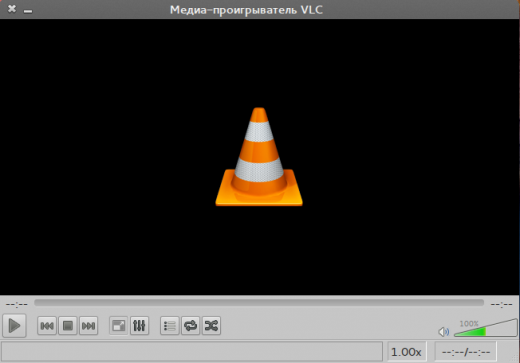
One of the most popular multimedia players this year has further strengthened its position in the Linux world. Now its functionality is practically no different from versions for other platforms, including added support for hardware decoding, several new formats, and improved integration with Ubuntu system interfaces.

Free video editors for Linux existed before, but most of them were aimed primarily at very simple “household” tasks. Therefore, the emergence of a real professional video editor did not pass our attention.
This is a selection of the most popular programs for Linux from one of the popular specialized publications. Let me remind you that the list includes only those programs that debuted on this platform during this year.
Did you think the selection of participants was incorrect? Suggest your favorite programs in the comments!
operating room Linux system is full of great programs, both open source and proprietary. Beginners are accustomed to using operating room applications Windows systems and Macs that don't run Linux and simply don't know about the available alternative programs. Even seasoned Linux users often find useful new applications.
Linux programs are also very easy to install. In most cases, they are located in the distribution's repositories, and all you need to do is perform a simple search procedure in the Software Center or a command in the terminal. While we're on the topic of terminals, there are plenty of programs out there to help you avoid using a terminal if that's your preference.
As is the case with any “best-of” list, there may be programs that we did not take into account when compiling the list. If you have anything to suggest for the list, don’t be shy and write in the comments!
Browsers
Firefox
Mozilla's Firefox browser is good browser For Linux users. It is still included in most distributions, and also fights for online freedom and better privacy. While some tests have shown that it may not be the most fast browser, it is the most flexible and customizable open source browser available.
Chrome/ Chromium
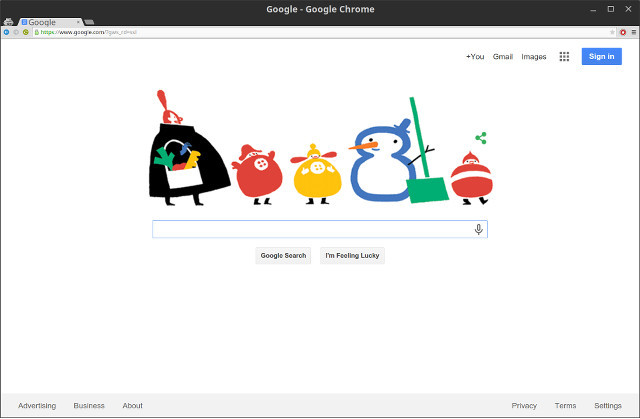
Popular Chrome browser from Google is also available for Linux. You will get all the same features, speed, security, and constant updates. It should be noted that for most distributions Chromium is available from a repository. However, if Chrome is not in the repository, then you need to download it directly from the official Google website.
Opera
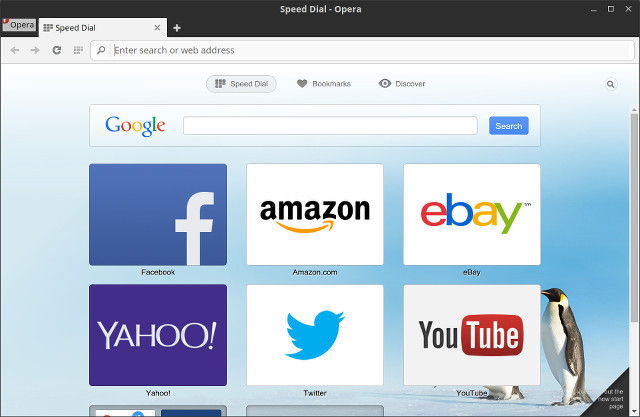
Opera always had a version for Linux until Chromium was included in distributions. For some time after this and until recently, Opera was only available for Windows and Mac. Since Opera is not so popular compared to Firefox and Chrome/Chromium, you are guaranteed to easily download this browser directly from the Opera website.
Games
Civilization 5

In this strategy game, you control a group of people and make sure they survive as long as possible. You start with a simple small settlement, whose inhabitants discover other nations around. You must always make sure that your people are prospering while you are negotiating diplomatically with other nations or declaring war on them. As you progress in the game, you can also conduct research that you can later use for the benefit of your people.
Team Fortress 2

The main hit from Valve, the creator of Steam, Team Fortress 2 is a funny team-oriented shooter. The game only works in multiplayer mode, so it's a fun game for a group of friends or anonymous players. The game has been around for a long time and will continue to be updated on a regular basis with new features added.
Minecraft

The most popular indie game is also available on Linux, thanks to Java's cross-platform features. In a virtual world made entirely of blocks, you can do whatever you want - mine valuable materials, create luxurious buildings or fight mobs in a survival game. Minecraft provides a lot of freedom of action, such a universal game is worthy of attention.
0 A.D.

The champion of open source gaming, 0 A.D. focuses on historical warfare and economics. Despite the fact that the game is still in development and only alpha releases are available, it is absolutely playable using all the existing features. It can be easily obtained through the repository.
Dota 2

A rival to League of Legends, Valve's Dota 2 offers an online battle arena. In this game you can fight other teams, collect gold, find items and so on. The game is very popular and attracts more than 800,000 players daily and works great on Linux.
Urban Terror
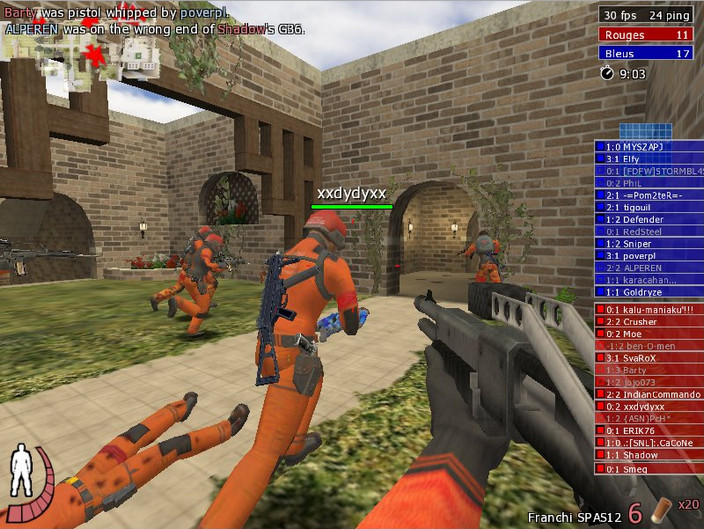
Built specifically for Linux, the first-person shooter Urban Terror is described as a Hollywood-style shooter that doesn't necessarily have to be realistic. The game has a lot of features, decent graphics and great action. Usually this game is not in the repositories, so you will need to download the game from its website. Luckily, there is a utility that will automatically download the game and also check for updates afterwards.
PC Maintenance
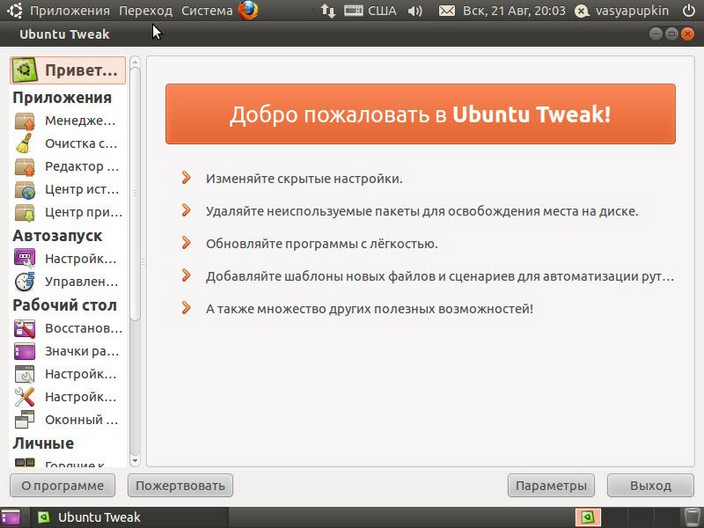
Ubuntu Tweak is a great application for managing some settings on your Ubuntu system. You can independently make settings that are not always possible to do using conventional configuration tools and clear the system of unnecessary files to free up space. Most importantly, the program can quickly and easily remove those pesky old kernels that you no longer need and are just taking up a ton of space.
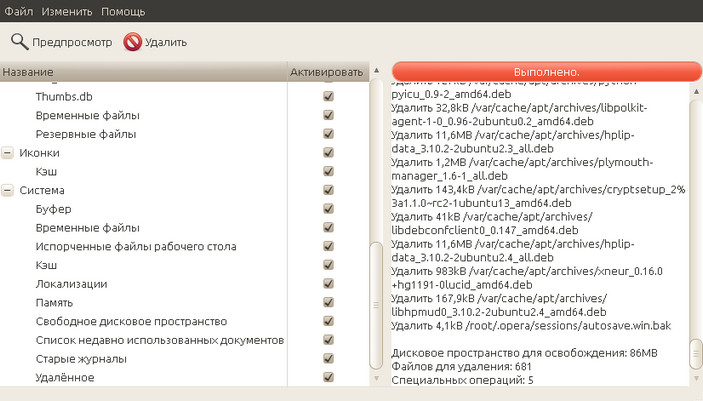
BleachBit - very handy tool, freeing up disk space and also protecting your privacy. Perhaps this program can be considered an analogue of CCleaner for Linux, since it supports “cleaning” a large number of applications, and also has tools that safely delete files or clear memory in such a way that deleted files could not be restored. The application also includes several other tools that allow you to improve productivity primarily by removing certain files.
Editors and development
Gedit
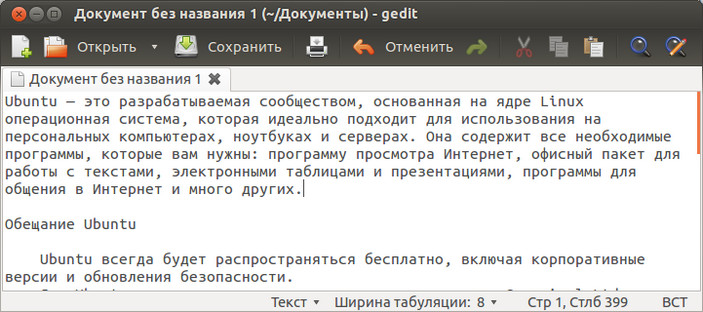
Gedit is the default text editor for GNOME, and while it may seem like it's the Windows equivalent of Notepad, Gedit is much more powerful, offering users more features and customization options. It can be used as a simple code editor. However, if you are looking for a complete development environment, then this is not what you are looking for.
Kate

Kate is the default text editor for KDE and is similar to Gedit, it looks like an alternative to Notepad but actually has a lot more features. Kate is perfectly integrated into the system, which can lead to a more productive and happier work if you have this system.
Geany

If you are still wary of IDEs, but think that Gedit and Kate are not functional enough for a code developer, then take a closer look at Geany. It is neither a text editor nor a true IDE (although some might argue that it is simplest version IDE) is a code editor. You will find here convenient functions, such as a compile/run button, viewing functions defined in the current file and much more.
Eclipse
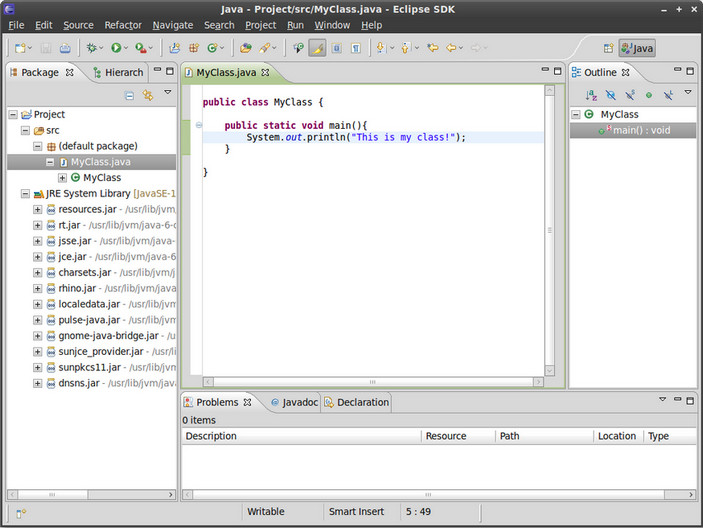
Eclipse is just the development environment for Linux, since it is open source, it is used by users of all operating systems and therefore has the greatest support. If you need a feature, chances are good that Eclipse will have it. And most importantly, it is easy to install by simply searching your repositories.
Documents/Office Applications
LibreOffice
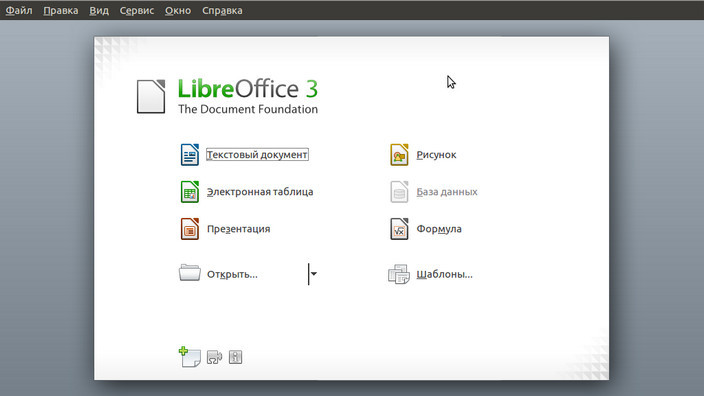
Without a doubt, the best office suite (excluding costal online products) is LibreOffice. It offers the most features and best compatibility with office Microsoft documents formats. While compatibility isn't always perfect, the app is pretty good and continuous updates only improve compatibility. You'll find equivalents for documents, presentations, spreadsheets and more.
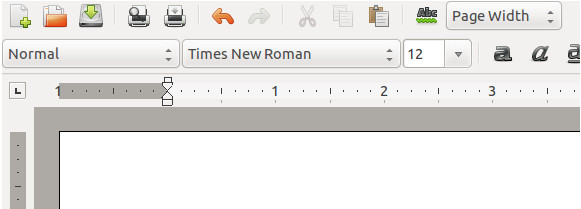
There is no package called GNOME Office, rather it is simply an accepted term to describe a suite of applications that includes AbiWord, Evince, Gnumeric, Ease, GnuCash and others. This good apps, which provide functionality, and are lightweight enough that you often see them with the distribution provided by LXDE. However, compatibility with Microsoft Office formats isn't always perfect, so this is a good set for when you're looking for functionality rather than compatibility.

Calligra is the new name for office suite KDE, which also includes all the applications needed to create documents, spreadsheets and presentations. Visually better suited to KDE, this set provides an acceptable level of compatibility with Microsoft office formats. Support open formats, such as odt format, Is not that great? However, these applications are chosen if functionality is needed, not compatibility.
Desktop environments
GNOME
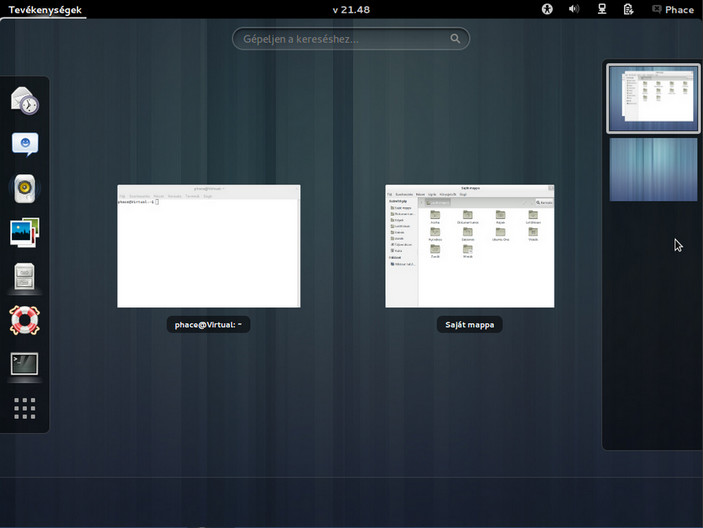
GNOME is a GTK-based desktop environment that offers a completely unique experience with the GNOME Shell, which features an Activities view and a greater emphasis on using virtual desktops. Even if you don't use pure GNOME, there are several desktop environments that use parts of GNOME in their installations, while others are based on GNOME code but have gone their own way. This desktop environment is generally considered to be a moderate user of system resources, although compared to Windows or Mac OS it is quite lightweight.
KDE
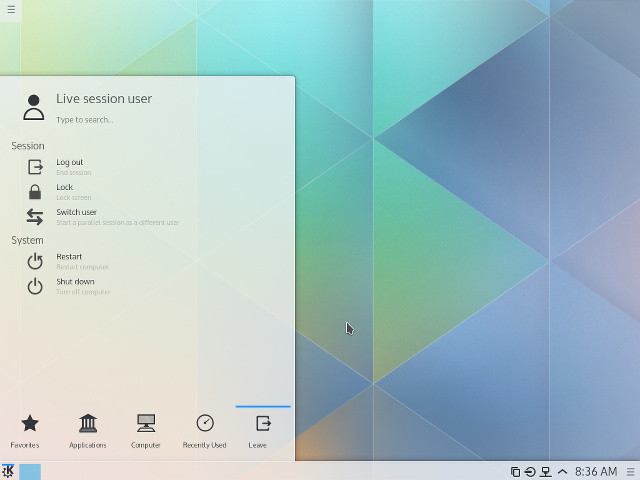
KDE is a Qt-based desktop environment designed to provide as many features as possible. It is often regarded as the most luxurious desktop environment, as well as the heaviest user of system resources. KDE 4 will soon begin to be phased out by KDE 5, which is more of a rewrite of KDE than a major redesign. You will be able to find KDE 5 in some distributions within the next 6 months to one year.
Xfce
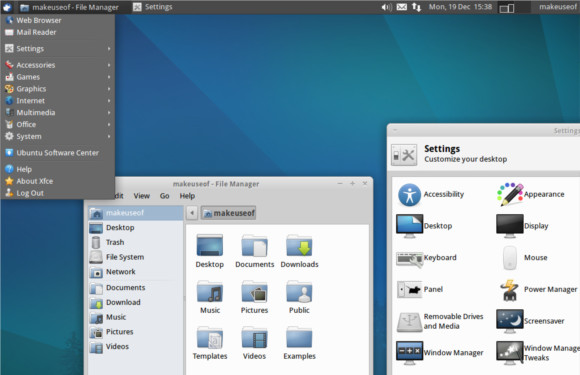
Xfce is another GTK-based desktop environment, but it has always been a standalone environment rather than having any ties to GNOME (which is also written in GTK). It consumes less system resources and is great for systems with lower specifications, and could easily compete with its heavier brothers.
LXDE
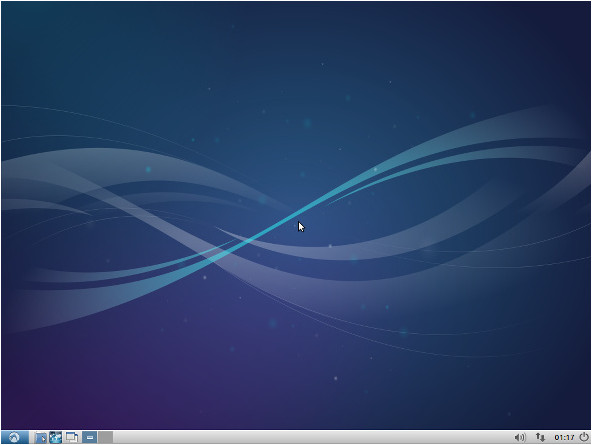
LXDE is undoubtedly the lightest traditional desktop environment available. LXDE uses surprisingly small volume random access memory, so it will be good choice for owners of not very powerful devices or for those who simply prefer to save every unit of power. We don't think it's the prettiest desktop environment (although tweaks can make it look decent), but it's functional enough.

Cinnamon - replacement Linux Mint's for GNOME Shell. While this environment uses some GNOME applications (and copies the rest, i.e. Nautilus becomes Nemo), the user experience is completely different. While keeping modern technologies and frameworks, it tries to preserve a more traditional way of working with the desktop instead of adopting the unique way of managing GNOME Shell windows. Since Cinnamon is evolving towards Linux Mint, it is not so easy to get Linux Mint on other distributions.
MATE
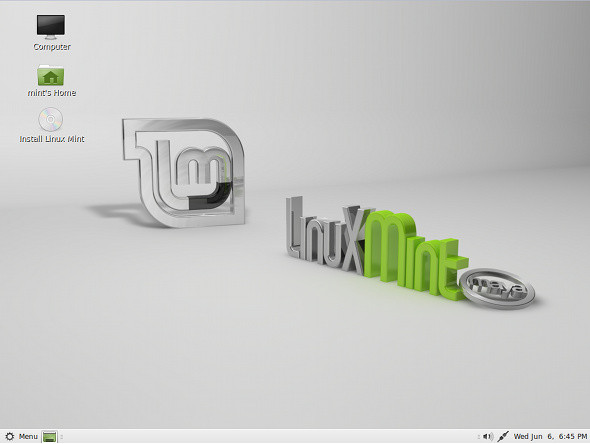
MATE is another Linux Mint project that aims to replicate the old GNOME 2 and support it, unlike GNOME which stopped supporting GNOME 2 after GNOME 3 came out. In fact, MATE's code was originally taken from GNOME 2 after it became unsupported and has since been used by Linux Mint developers. As stated, they are committed to keeping the desktop look the same, but there are plans that they want to port the desktop environment to a GTK3 base to keep up with the latest technology.
Unity
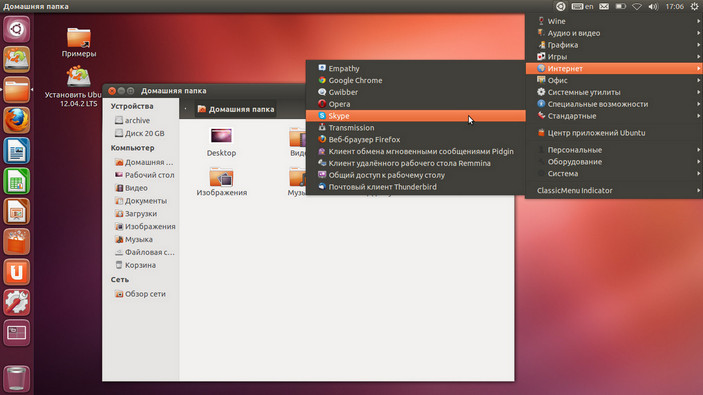
Unity is a child of Canonical, the company behind Ubuntu. Unity was developed by Canonical when GNOME announced plans for GNOME Shell and Canonical didn't want to take Ubuntu in that direction. Despite the fact that many Linux users have complained about Unity, it is still quite easy to use, customizable, and most importantly, familiar. People use Ubuntu more than any other Linux distribution, so Unity is perhaps the most familiar desktop environment of them all.
Audio, video and images
![]()
If you need to work with audio, Audacity has long been the undisputed open source champion in this area. With this application you can perform almost any manipulation with audio. Trimming, merging, splitting audio into multiple tracks and many additional functions - Audacity can do it all. You can also save your designs and then export them in a variety of formats and views.
GIMP
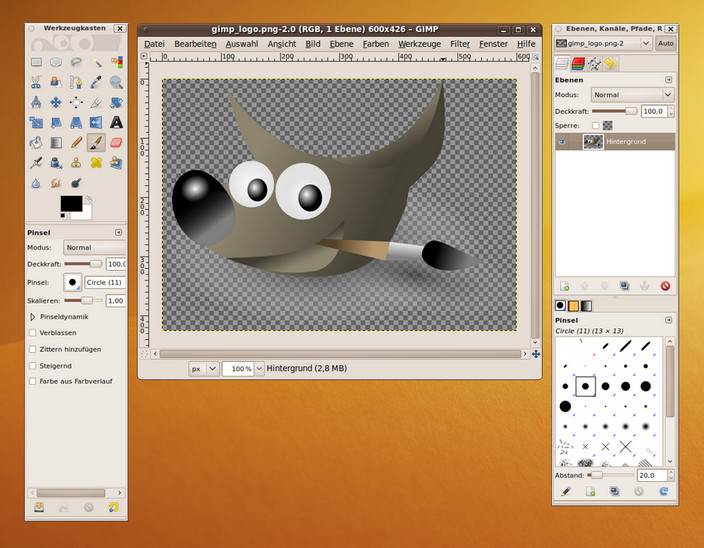
GIMP is Photoshop's closest cousin. And there is very, very little that you can do in Photoshop that you can't do in GIMP (it may just require different steps to achieve the same result). The program can read almost any format, allow you to tweak images, make more drastic changes, or even render graphics from scratch, and then save them as a GIMP project or various image formats. GIMP can even import videos and convert them into a GIF file. This app is definitely worth considering if Photoshop is a tool you use regularly.

If you need to make a simple home video, then PiTiVi is a great tool for you. It allows you to make basic changes such as trimming clips, splicing clips together, adding various effects, adding transitions between clips, exporting the final product to different file formats and qualities. PiTiVi is definitely not an advanced video editor - it's designed for use at home - but it's nonetheless capable and worthy of a recommendation.
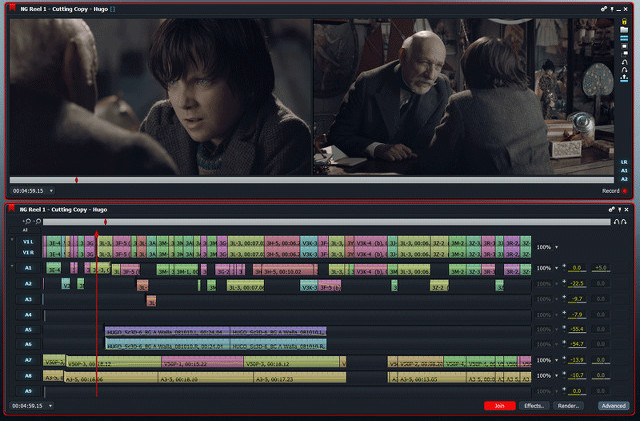
If you want a more powerful video editor, then Lightworks is probably the way to go. best tool, available for Linux. It is so good that it has even been used in several Hollywood productions for video editing. Minuses? Fee - $438 to acquire the right to own full version. But free version gives you all the same tools, but only limits MPEG-4 export to 720p resolution. But at least you'll know there's a professional video editing solution on Linux if you need it.
Email and communication
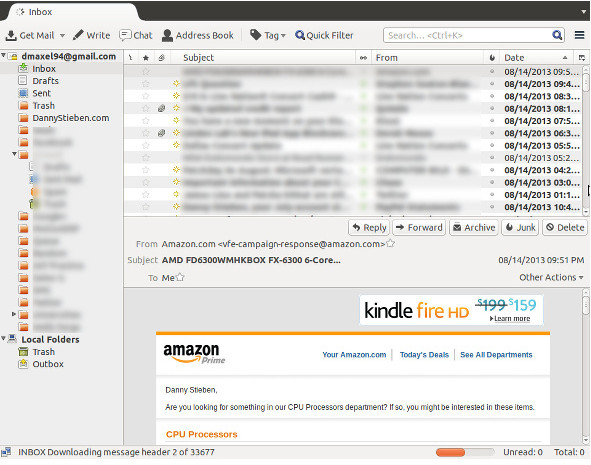
Another popular application from Mozilla, Thunderbird, is also an excellent email client for Linux. It may not be the lightest option among email clients, but it is one of the most advanced customization options, which can be very important to some people. For example, Thunderbird can apply different settings to each user individually, unlike, say, Evolution, which has several options that can only be applied globally. Unfortunately, Thunderbird no longer receives as much attention from Mozilla as it once did, but updates are still released periodically to fix code and improve security.
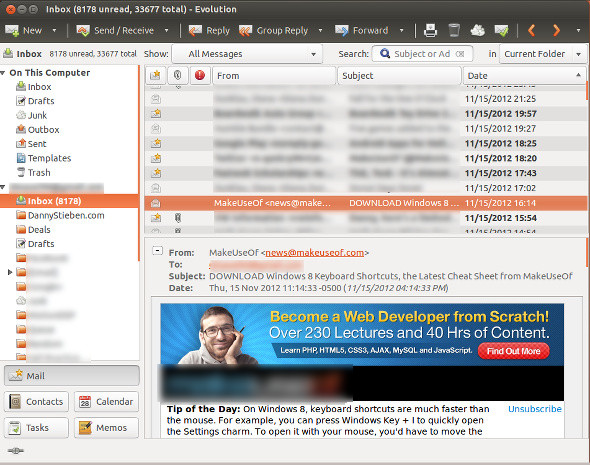
This email client is usually shipped with distributions of the GNOME desktop environment. It's a good email client that looks nice, supports the new Google calendars, and even supports Microsoft Exchange accounts. It also has tight integration with GNOME Shell, so you'll be able to get new email notifications and a calendar app connected to Evolution calendars.
Kmail

This is the default email client for the KDE environment. It is heavily loaded with features and also provides good integration with KDE and related services. It may look a little weird, but you may have to tinker with the settings at first before it looks the way you'd like.
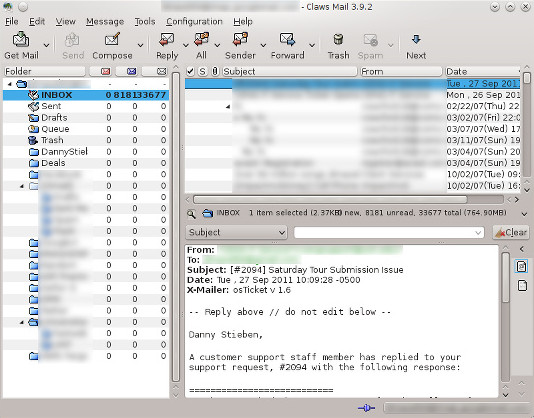
If you want a simple email client that's lightweight and lets you focus on your correspondence without having to additional features, then you need Claws Mail. This email client also takes security into account when displaying regular text emails. You get the idea - simplicity, security, stability. We have some tough competition between this client and the other three email clients recommended in this category.
Pidgin
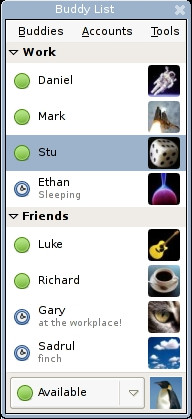
Besides Email, you can also send instant messages to people. Pidgin is an amazing instant messaging app for many network protocols, including all the most popular ones such as Google, Yahoo and Facebook. It also offers a great plugin where Pidgin's functionality can be extended to do whatever action you'd like to take.
Skype
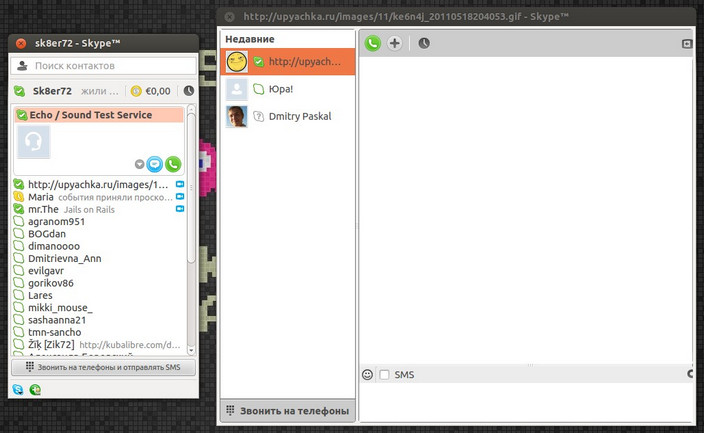
Of course, one of the most popular chat rooms on the web is Skype, and of course it has a version for Linux. It's not exactly the same version as for Windows and Mac, but it still offers enough features to be able to do everything you're used to doing with Skype. Microsoft also recently updated the Linux client, making it more stable and compatible with new versions of PulseAudio (this app handles communication between apps and your audio hardware), which is a big improvement over previous version Skype client.
Xchat
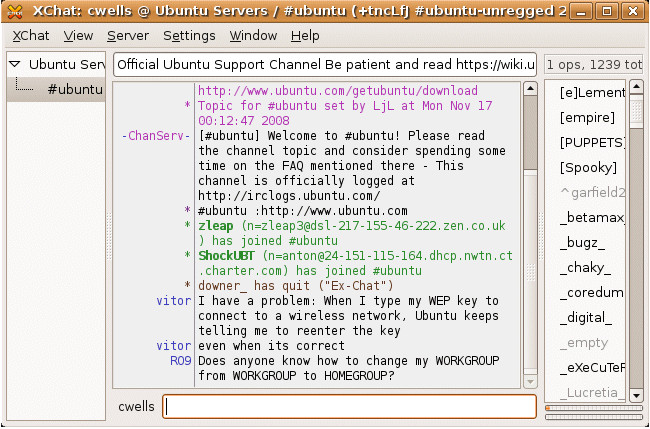
Linux communities often use IRC chats to quickly connect with others who have similar interests. Our top pick for an IRC client for Linux is XChat, which is clean, easy to use, and highly customizable. If you are looking for something for app consolidation, then you could use Pidgin, but the IRC experience in Pidgin is not as good as with XChat.
Media players
Totem
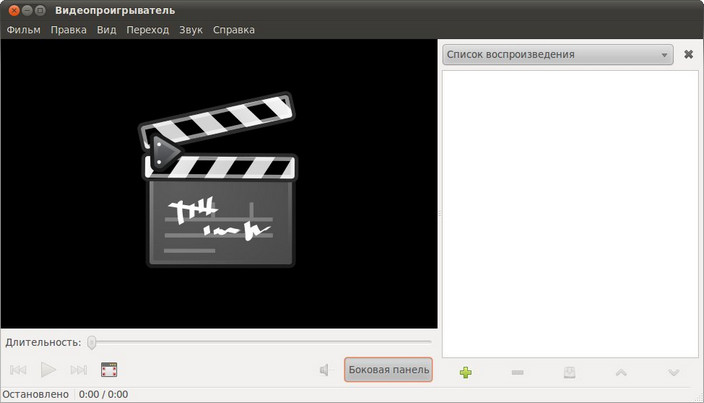
Totem is a media player that is usually bundled with GNOME and GNOME-based desktop environments. It's a fairly simple media player that plays video but can also play music. There's no fiddling around to set up - it's designed to be easy to use, without any fuss. And it does it well, as Totem rarely causes any problems. Totem even offers to install the appropriate codecs for whatever you're trying to play with a single click, assuming those codecs aren't already installed, of course.
VLC
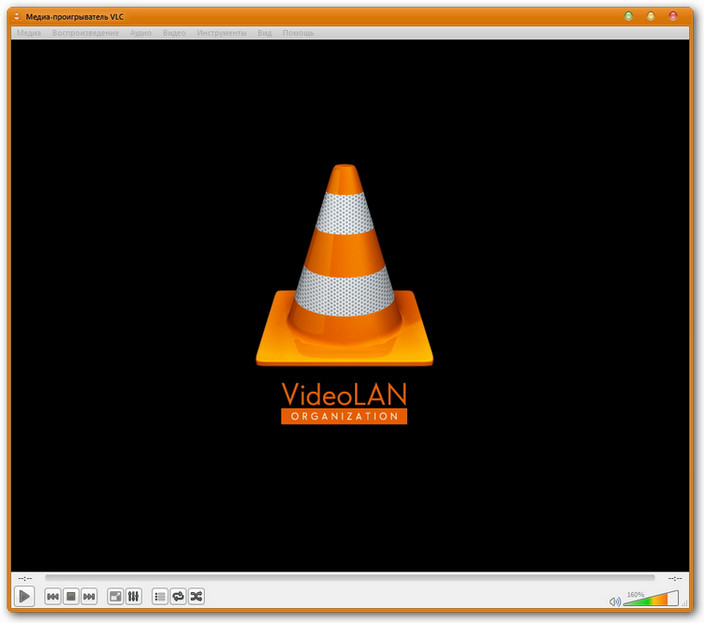
If you want complete control, power, and the ability to play every format that exists, then you need VLC. It has always been a favorite among the Linux community as it handles anything you can throw at it with ease. It is increasingly appearing as the default media player in distributions, and this is quite natural.
Mplayer
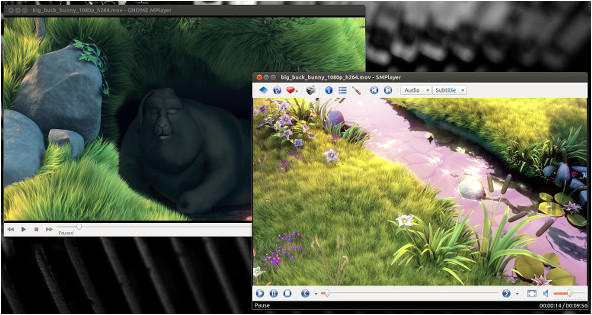
Mplayer is another great multimedia player that can handle almost anything you want to play, but interestingly does not have a GUI. Pure Mplayer will play the content directly in the terminal or by opening a very simple window without other controls. There are, however, third-party GUIs that you can use to control Mplayer. While VLC has more configuration options, Mplayer can be more flexible, depending on what your needs are.
How can you make this list better?
And there you have it, our list of the best Linux software. In fact, there are much more programs than this list can accommodate, and remembering everything or trying to try everything is unfortunately impossible. If you know of a great app that didn't make the list, it might not be intentional. Leave a message in the comments which app you would like to see on the list and why, and we may update the list to include it.
What Linux software do you like?
Every Linux user has a set of their favorite applications. This choice depends on the preferences, habits of the user, as well as on his distribution. Because different distributions use different default applications.
Finding and trying out new applications is one of the most exciting things for us Linux users. After all, almost all of them are free. It's also interesting to get recommendations from other Linux users. This way, you gain enough knowledge and experience to make your list of the best programs for Linux. There are many similar lists on the Internet. Some of them include only the most popular, reliable and proven applications, while others are new and not yet known to anyone. This list is something in between. Our goal is to review quality software while staying up to date with what's new in the Linux world.
Now let's move on to the list of the 30 best Linux programs in 2015:
For developers
1. Eclipse
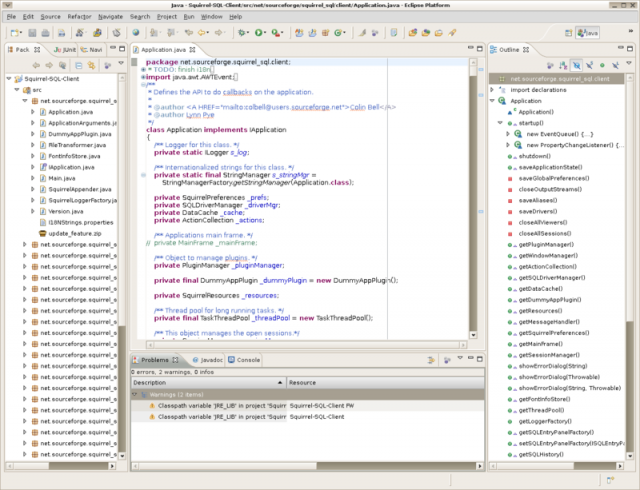
Eclipse is a popular integrated development environment (IDE) that runs just as well on MacOS and Linux as it does on Windows, thanks to its Java-based nature. Eclipse supports many plugins that add support for programming languages such as: Python, C++, Ruby, Scala and Clojure. This extensibility allows programmers to customize Eclipse to suit their skills and project needs.
2.LightTable
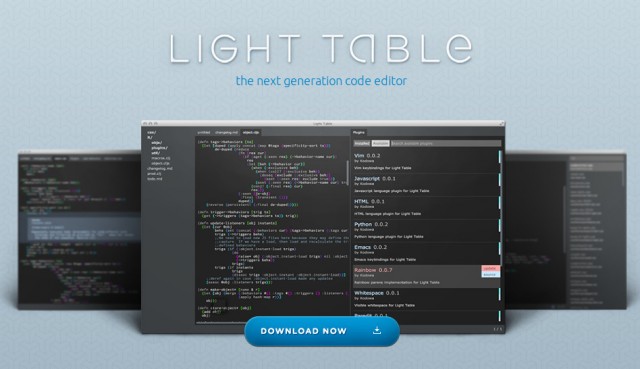
LightTable is a code editor with a modern look and a huge number of plugins. It supports multiple programming and scripting languages. What sets LightTable apart from other applications is its ability to instantly evaluate expressions and immediately see the results of changes in the source code. It will allow you to better understand how your code works, and perhaps find and fix many errors earlier.
3. CodeBlocks
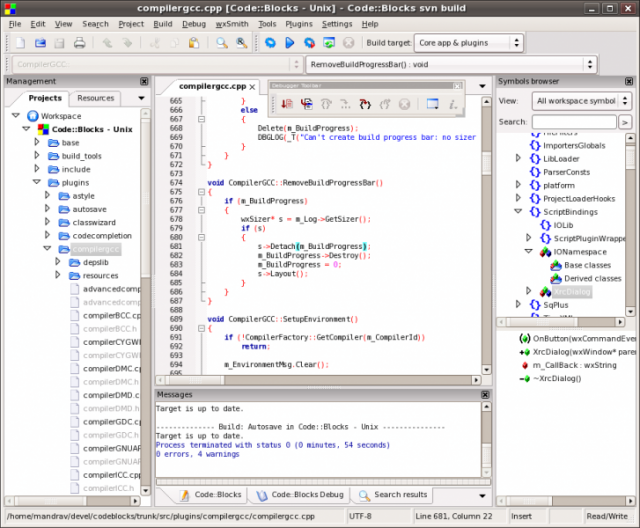
CodeBlocks is a development environment for C, C++ and Fortran. It is also cross-platform, supports several types of compilers, code folding and auto-completion. Among the others useful functions CodeBlocks is a tabbed interface, hex editor and GUI designer module for creating graphical applications.
4. Brackets

Brackets is a beautiful and lightweight text editor that is mainly used for HTML editing and CSS files. It supports all the features of modern text editors, such as: automatic indentation, code folding, and of course, countless plugins. A special feature of this editor is the LiveView function, which allows you to see all changes in the code on the fly in the browser. A very useful thing for web development.
5. Aptana Studio
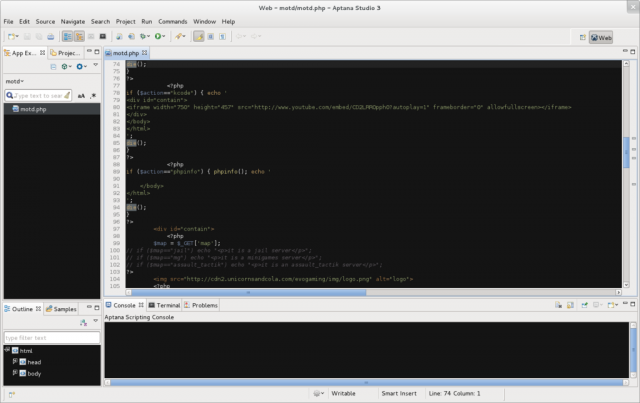
Aptana Studio is an Eclipse-based environment focused on web application development. With plugins it allows you to create Adobe AIR and iPhone apps. Additional features include a code assistant, a built-in terminal, and Git integration for improved version control.
Best programs for Linux in the genre of software development and text editing have been considered, now you can move on to communication.
For communication
6.Pidgin
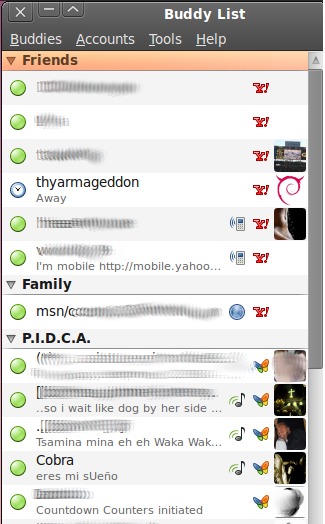
Pidgin is a Linux messenger that is a favorite of many users, and for good reason. It supports all popular chat protocols - Gtalk, IRC, Yahoo, ICQ, XMPP, and others, such as Facebook. Pidgin also runs on Windows and has many cool features such as custom emoticons, status messages, Various types notifications, and grouping and filtering friends.
7. Telegram
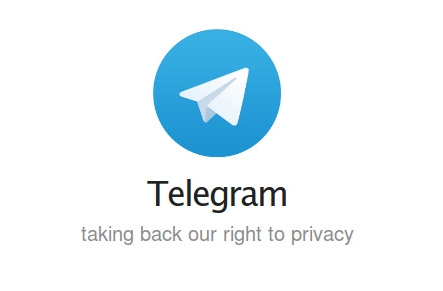
Telegram is a new player in the messaging industry. But it has an advantage over Pidgin and many other instant messengers - it supports almost all platforms - OS X, Android, iOS, Linux, Windows and Windows Phone. Attention is focused on privacy and security, so all data is encrypted and even has a self-destruct function. All your chats are in sync with other devices and you can use Telegram to send files to groups of up to 200 friends.
8. Claws Mail
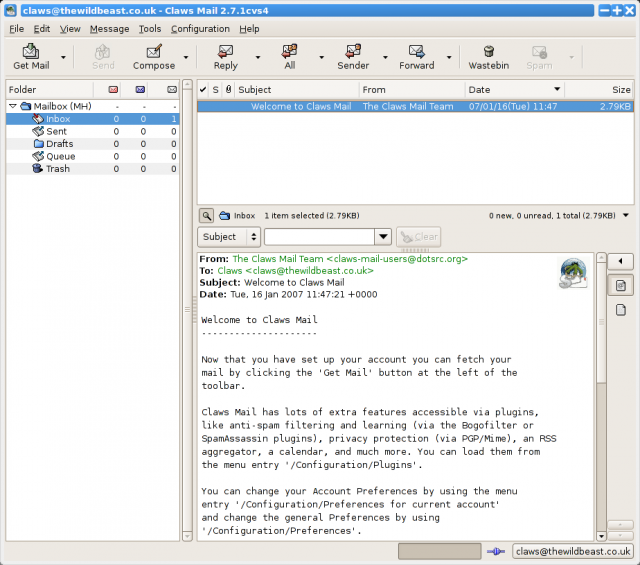
This email client is ideal for those looking for simplicity and stability. It has a laconic interface and many useful functions - support for multiple accounts, filtering emails, folders, scheduling emails, integrated The address book and anti-phishing, etc. Claws Mail is a great alternative to Thumderbird, which many describe as too bloated.
9. Choqok
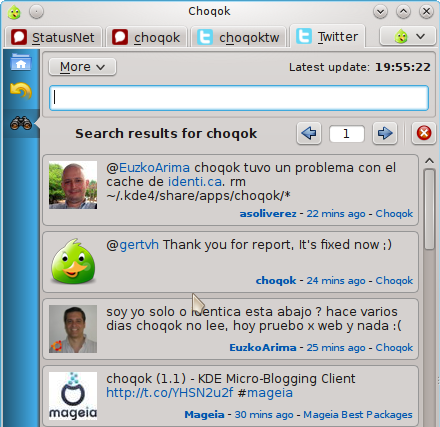
There aren't many Twitter clients for Linux, and at least not many that support all the necessary features. Choqok is a feature-rich and easy-to-use Twitter client with support for multiple accounts, notifications, lists, image and video previews, URL shortening, and tweet filtering.
10. Jitsi
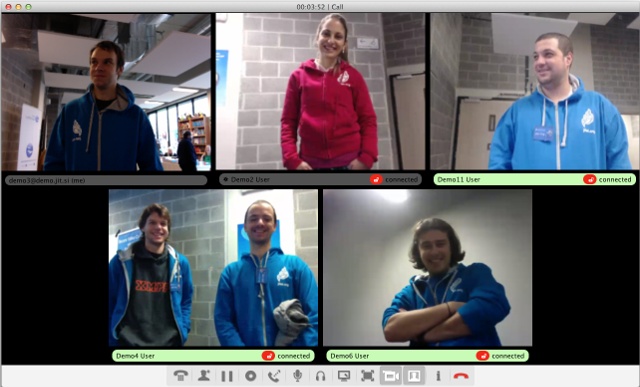
Jitsi is proof that there are powerful alternatives to Skype for Linux. This is a full-fledged communication center with support for Google Talk, Facebook Chat, Yahoo, ICQ and XMPP, but that's not all. You can use jitsi for audio and video calls, conference calls and group chats. It supports encrypted conversations, file transfers, call recording, notifications and more.
For the Internet
11. Firefox
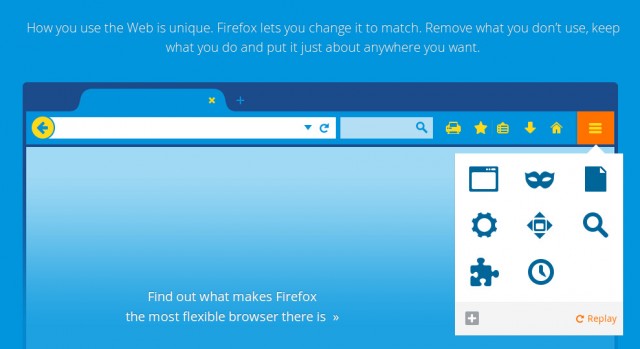
Firefox comes as the default browser in many Linux distributions. Also it supports hundreds of extensions to modify appearance and functionality. This is a great browser for all types of users because it's easy to personalize. The growing number of users around the world should convince you to try it if you haven't already.
12. SpiderOak

Backups are very important, but people forget about them and consider them an unnecessary hassle. SpiderOak is free way automate backup. The free account provides 2 GB of cloud storage space. You can install the client on Personal Computer, as well as on a smartphone. You can set up backups of only certain folders, set a schedule, and protect files with a password.
13. qBitTorrent
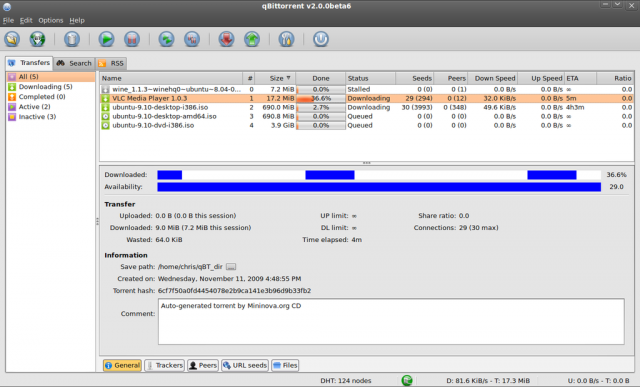
qBitTorrent is often described as best alternative uTorrent on Linux. It is lightweight, has a nice interface and all the necessary functions: comprehensive search, DHT, peer exchange, encryption and port forwarding, IP filtering and download queues.
14.TeamViewer
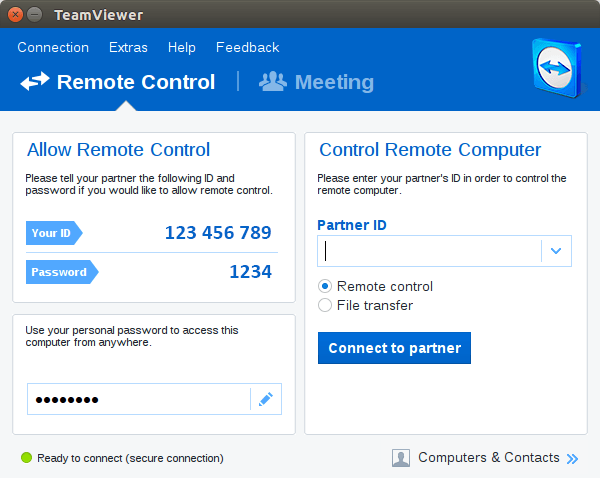
TeamViewer is not an open source program, but it is on this list because it has a version for Linux. And also because many new users rely on it when faced with a serious problem. This is a program for remote control, which allows another user to connect and control your system. It can also be used for online conferences and transferring files directly between computers.
15. Uget

Not all files can be downloaded from torrents, and if you don't want the browser to be running all the time, you'll need a download manager. And Uget is the best, it works on Linux, Windows and Android. It supports queues, download scheduling, and download resuming. Uget has even more than you need, but nevertheless it remains lightweight and easy to use, which is why it deserves high praise.
These are without a doubt the best linux programs for working with the network.
For safety
16. Tor
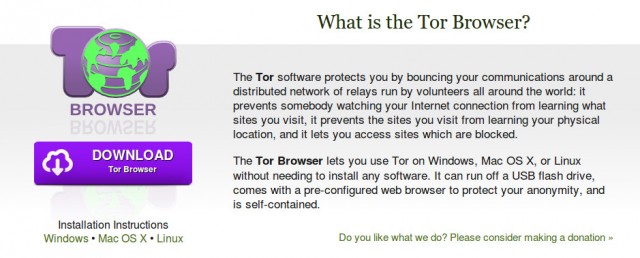
We could pretend that we are safe or console ourselves with the thought that we have nothing to hide, but the fact is that privacy and security are extremely important, and it is very wise to maintain them on the Internet. Tor can help you with this task. It provides a browser and communication tools that block tracking attempts and provide anonymous surfing. You can find out more information about it on the official website of the project.
17.KeePass
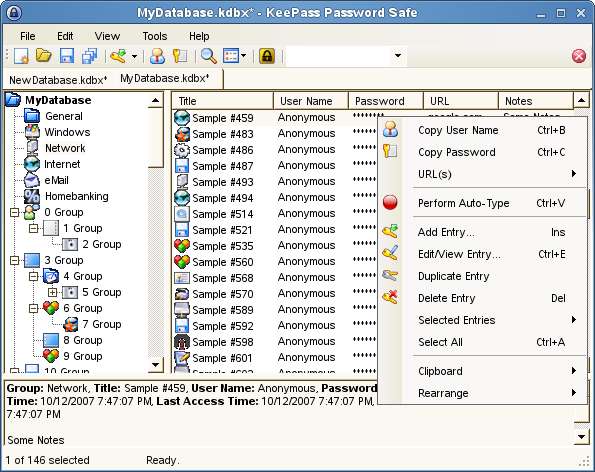
Offline security is just as important as online, if not more so. Your passwords should be stored in a secure, preferably encrypted place. KeePass solves this problem. It can run without installation and supports importing and exporting your passwords in various formats. The program will also help you create new passwords using a random value generator and clipboard integration.
18. Tox
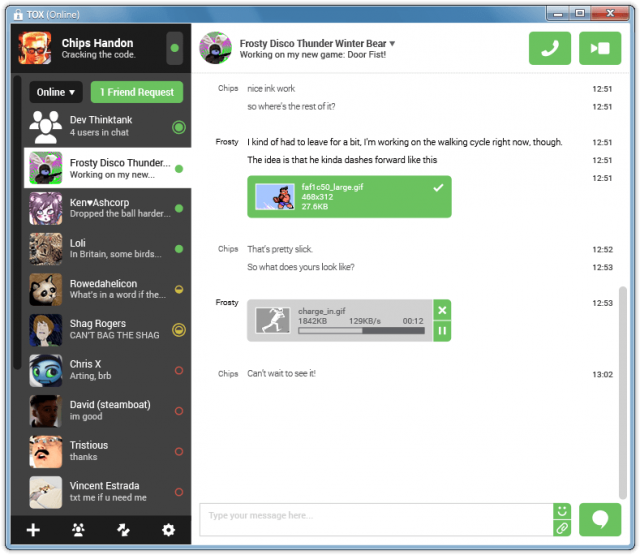
This program could be called in the communication section, but it is very focused on security and confidentiality. Tox allows you to exchange encrypted messages with friends and make free audio and video calls. The program also has a beautiful interface that will fit well into any desktop environment.
19.Privoxy
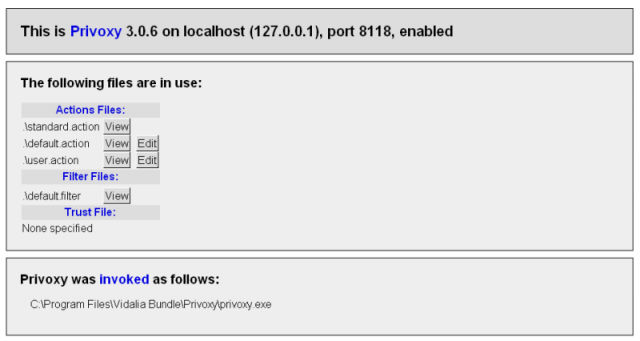
Privoxy is an advanced web filtering tool that you can use to block ads, prevent tracking, and prevent sites from monitoring your computer. It's a complex tool and you'll need to put a lot of effort into setting it up, but it will protect your privacy well.
20. Gufw
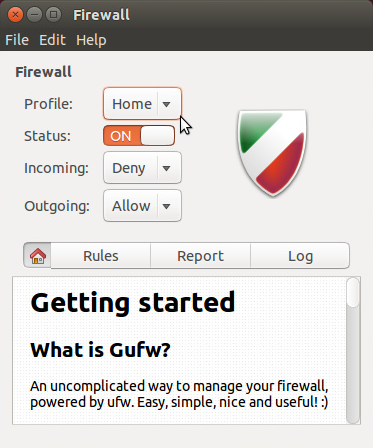
This is a simple and easy to configure firewall for Linux. Gufw can be configured in a couple of clicks. It provides basic protection, and also supports application traffic filtering and additional rules. You can also use it to track what's happening on the web as you browse the web.
For working with graphics
21 Krita
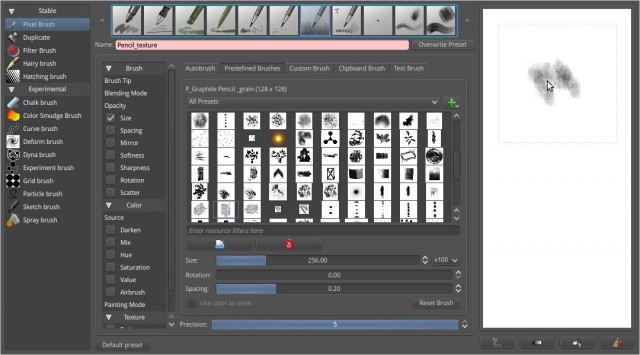
Krita is a must-have program for digital artists and illustrators on Linux. This amazing app can be customized to suit your work environment and has a mode that lets you turn off the clutter and focus on your art. You can use Krita to create patterns and textures, modify and import your brushes, apply filters and effects, manage layers, and achieve perfect symmetry in your drawing.
22. Pinta
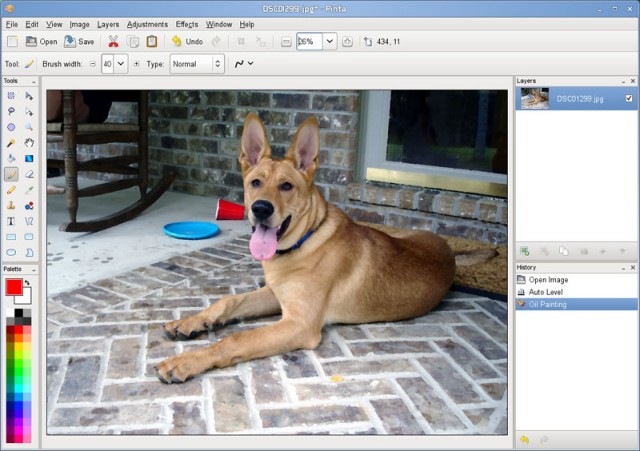
Pinta is inspired by Paint.NET and provides all the tools you need for image editing and drawing. It's a bit like Microsoft Paint - easy to use, but still lacking some features. You can use Pinta to draw different shapes, retouch images with effects and filters, and manage layers in your photos.
23. Gimp
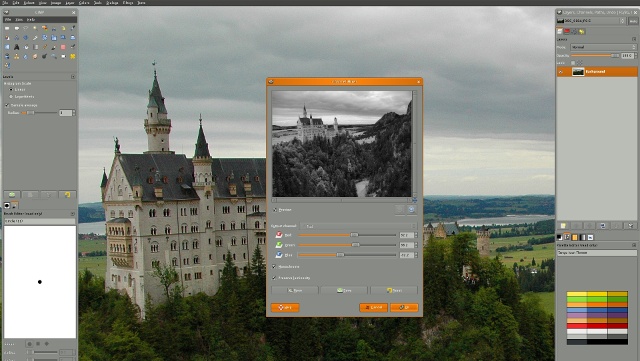
You've probably already heard of Gimp - it's the most powerful image editing tool on Linux. It fully deserves the title of a Photoshop alternative. If the default features aren't enough for you, there are plenty of plugins that add new features and effects. This best software for Linux for working with photography.
24. Darktable

Darktable can be useful for professional photographers. It supports image editing in RAW format. Here you can adjust every little detail in your photos. The program manual is available on the official website in pdf format.
25. PhotoQt

PhotoQt is a lightweight application for viewing images on Linux that contains many functions. You can view images in a slideshow, set wallpaper while viewing, rename, delete, scale, rotate images, set your own keyboard shortcuts, etc.
For fun
26. Ataci
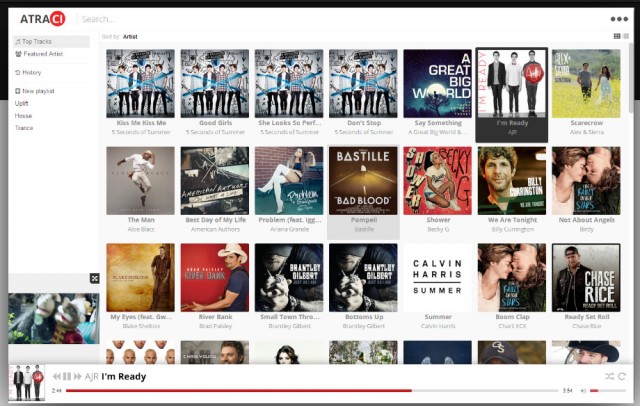
Ataci is a fresh, cross-platform app that lets you search and listen to music directly from Youtube. You can combine your favorite tracks into playlists, watch videos in full screen mode, and also view the current top songs.
27. Miro
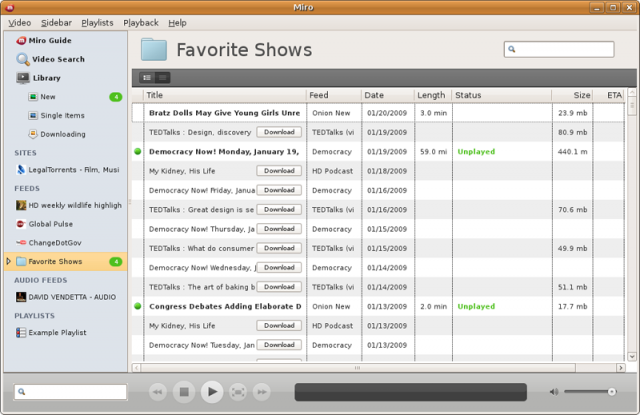
Miro - formerly known as democracy player - is a universal multimedia application that allows you to open many audio and video file formats, online streams, watch Internet TV and download videos. It can also convert some video formats and has a built-in torrent. Miro can be considered a full-fledged multimedia center.
28. Tomahawk
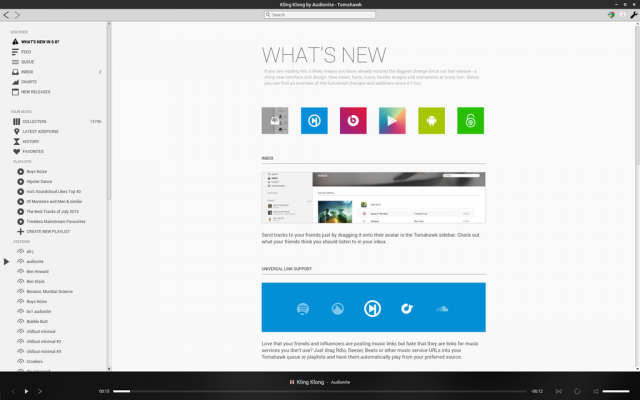
This is a truly innovative Linux application that combines music and social media. Tomahawk allows you to play songs from online services such as Last.fm, Soundcloud, Grooveshark, Jamendo, Deezer, Google Play music and many others. By connecting to your accounts, you can get detailed statistics about your music compositions and preferences. Tamahawk makes it easy to share music with your friends and get recommendations based on your tastes.
29. Clementine
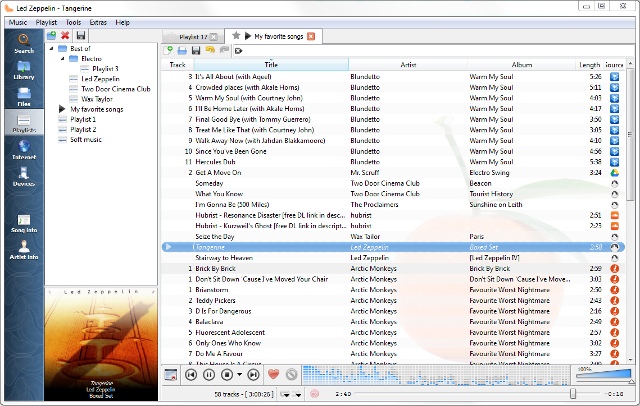
Clementine is a stable music player inspired by the Amarok player, but not as difficult to use. It has a lot of great features - a tabbed interface for playlists, artist and track information, search and streaming support, opening and downloading podcasts, Spotify and Grooveshark support, remote control With using Android, support for copying music from USB and mp3 players. Clementine is everything you need to enjoy music and manage your music collection.
30. SMPlayer

SMPlayer is one of the most practical multimedia players for Linux because it comes with built-in codecs and is ready to open all popular formats out of the box. He can open Youtube video, download subtitles for your films, and also set individual settings for each of the files that you open. Advanced users will appreciate features such as equalizer, filters, subtitle position, and synchronization.
conclusions
Of course, these are not all the best programs for Linux; there are many more applications that should rightfully be included in the list of the best. What are your favorite Linux applications? Can you recommend some new, less popular apps? Tell us about it in the comments!
Let me clarify right away for those who are not aware of the GNOME Flashback project: it is dedicated to fans of the classic session of the GNOME 3 desktop environment, bringing back the traditional two-panel layout that is still loved by many users. The GNOME Flashback Project was formerly known as GNOME Fallback.
Famous Ubuntu developer Core and Debian Dmitry Shachnev announced that the latest GNOME Flashback packages versions 3.16 and 3.17 are now available in the...
Lubomir Rintel announced the fourth release of updates for NetworkManager 1.0 - management software network connections GNU/Linux operating systems. IN current version A large number of improvements have been made to the IPv6 protocol.
Also, according to the release notes, you can now change various configuration parameters without restarting the NetworkManager daemon, including when changing DNS. NetworkManager is now able to maintain correct routing configurations when connecting multiple interfaces to one...
Canonical developers have announced that a large number of Firefox vulnerabilities have been fixed and version 39.0 has been added to all currently supported versions of Ubuntu.
The software can be used on any platform, including Windows, Mac OS or Linux to enable media interaction with a range of devices. It makes it easy to turn your computer into a local media library. In addition, Plex MS comes with a large number of plugins that expand the application's capabilities even further.
According to the changelog, remux now works on PPC platforms, a tweak for the timer has been added HTTP request, was …
Wireshark is one of the most popular cross-platform and open source network analysis software. On this moment There are versions for GNU/Linux, Mac OS X and Microsoft Windows.
According to the release notes, this release fixes minor security issues, updates support for some protocols, and resolves several bugs discovered by users since the previous release.
Release details:
https://www.wireshark.org/docs/relnotes/wireshark-1.12.6.html
The presented game engine supports all the latest hardware platforms virtual reality, including Oculus Rift, Samsung Gear VR, Steam VR and HTC Vive, Leap Motion and Sony Morpheus for PlayStation 4. It has been officially released for all supported operating systems, including GNU/Linux, Mac OS X and Microsoft Windows.
Characteristic features of this edition: grass visualization, improved post-processing, support for network replays and expanded size mapper support. Working with several...




